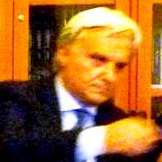The Teatro San Carlo in Naples opened its new season with Vasily Barkhatov's new production of Turandot. The Russian director's staging at first appeared shocking, so much so that at the premiere it provoked protests. Barkhatov has got rid of the original Chinese setting and, as for the scenography, he draws inspiration from the Abbey of San Galgano, as it appears in Andrei Tarkovsky’s film Nostalghia. However, is only a container for a myriad of visual ideas with which he stuff his setting, overshadowing the music and drama therein.
The director’s core idea is that the original Turandot story is but a reverie: in the prologue, a movie shows Calaf and Turandot travelling in a car as they return from Timur’s funeral. After she refuses to marry him, they have an accident and, while Calaf is on the operating table, they “dream” a tale, that is the story Puccini put into music.
This gives Barkhatov the pretext to roam freely in the forest of his cultural fetishes. With the aid of Zinovy Margolin's sets, the stage is jam-packed with characters straight out of a dark, postmodern fantasy novel, with Galya Solodovnikova's eerie costumes and all the props one can imagine. There is no anchorage to any particular cultural milieu, historical age or geographic place: anything goes, from Dante’s Commedia to the gothic novel, from the Scots guards carrying the Emperor in a glass case to neon signs signalling the solutions to the riddles. Moreover, to remind us that it is but an hallucination, every now and then a smashed-up car and an operating room are lowered and raised on the stage. In short, there are a whole load of multifaceted cultural backgrounds (graphic novels, movies, video games) which a director of the Generation X grew up on, something more traditional opera-goers have further and further to come to terms with.
The vocal cast was focused on Sondra Radvanovsky’s Turandot and Yusif Eyvazov’s Calaf. Radvanovsky has a lovely voice and impressive stage presence, and she depicted the psychological ambivalence of her character (cruelty and fragility) with intense, fine acting. Eyvazov once again showed that he has all it takes to be deemed among the most reliable interpreters of melodrama. His timbre may not sound the smoothest, yet his technique and interpretation are excellent. He sang with impressive fluency and fine phrasing and did a good job in the most keenly anticipated aria, “Nessun dorma”.
Rosa Feola was a tender Liù, with a gracious and charming vocal line, reaching her top in the scene where her inner beauty and kind-heartedness is brutalised until she commits suicide. Alexander Tsymbalyuk sang the melancholic, yet tender Timur was remarkable for both his volume and pathos. The ministers Ping, Pang and Pong were finely cast and their acting was comical and witty.
Nicola Martinucci’s Emperor Altoum was possibly meant to be a special treat, nothing more than a homage paid to the 82-year-old tenor. His vocal performance showed all the signs of age, though he was well received. The rest of the cast was good, especially the Mandarin of Sergio Vitale.
Dan Ettinger’s conducting was both rational and profound, as he rendered in depth Puccini's lavish musical subtleties. The colours of the orchestra were captivating, as was the deep dramaturgical sense the conductor aroused from the contrasts presented in the score. The chorus was cohesive and proved one of the main assets of the performance.




